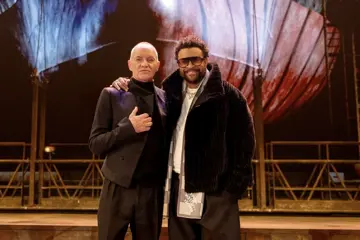 Sleater-Kinney
Sleater-KinneyIt's been ten years since Sleater-Kinney last played to an Australian audience at the Big Day Out in 2006. They were then touring their seventh record The Woods, the last before a hiatus that lasted until the band 'found their way back' and released No Cities To Love in January last year. The release led them onto a stage in the "tiny" Washington city of Spokane, a return Tucker describes as "nerve-wracking", "powerful" and "really emotional".
Now it's time for the band to reconverge upon Australia, a country that holds a special place for the group as the recording site of their self-titled debut record. "We've always had a really good time there and had great shows," Tucker says.
"Until there are more women in the music industry who are very powerful — financially powerful — I don't see the opportunity for change there."
But was she ever worried that after almost a decade their fans would've moved on? "We definitely were concerned that our fans would've moved on after so much time, and that kind of self-doubt can eat you alive if you let it, or if you worry so much about what people will think you're not really being true to the music you're supposed to make. The music should be something that's extremely important to you, and if you've done that right then it will connect with other people I think.
"It was like every recording experience we've had — it was frustrating, it was really fun, it was really tedious at times, but everything worked out how it was meant to be."
As part of their Australian tour, the band will be performing at Sydney's All About Women, a festival dedicated to providing a safe space for the discussion of issues affecting women. "I think that until we feel like women have achieved equality both culturally, financially and politically, there's a lot of different strategies that we should do to empower women... I definitely think that discussion and encouragement to think about those issues can be one of the ways that we can highlight that journey."
Don't miss a beat with our FREE daily newsletter
Tucker says that women trying to make it in a male-dominated industry need to "overprepare". "I think that you really have to take yourself seriously if you expect other people to. I would always overprepare for any recording session, for any performance, for anything that you do. You have to work extremely hard, and you might even have to work a little bit harder if you are working in a male-dominated field."
And what of the industry itself? What strategies could the music industry implement to reduce the boundaries to women's participation? "Unfortunately, industry doesn't really work that way. Industry is about making money, right, so until there are more women in the music industry who are very powerful — financially powerful — I don't see the opportunity for change there. I think that more women have to be in positions of power in industries like music for it to really change.
"I think that there's going to have to be more record labels that are run by women, more festivals that are run by women, more women who are running clubs, y'know? It's just like in any industry, you want to see women who are earning as much as men, who are as powerful as men, to feel like you're truly equal."















